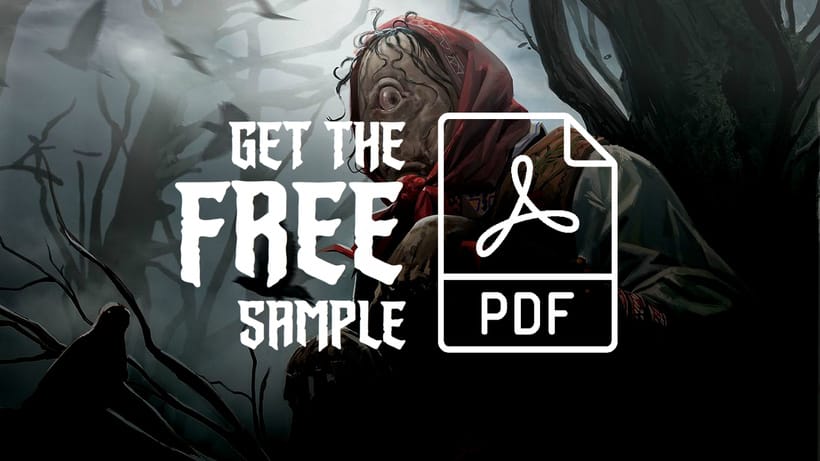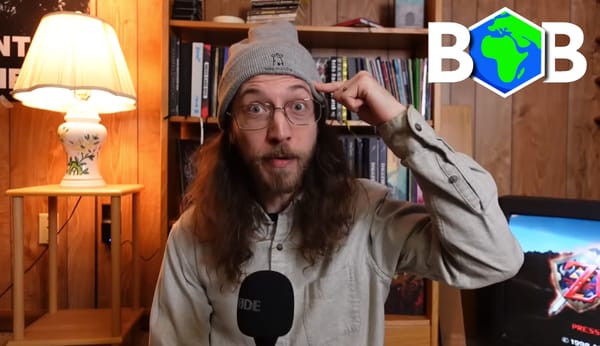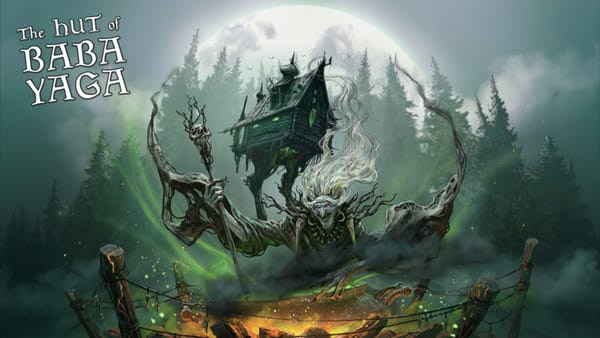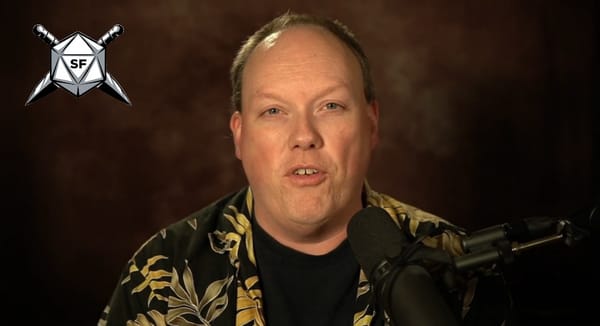From Storyteller to Mentor: The Legacy of Guy Sclanders and How to Be a Great GM

There are few figures in the tabletop RPG space as instantly recognizable — or as deeply respected — as Guy Sclanders, the creative force behind How to be a Great GM. For years, his voice and vision have guided thousands of Game Masters from hesitant first-timers to confident cinematic storytellers. With a background in acting, live television, and a passion for immersive narrative design, Guy didn't just teach people how to run games — he redefined how we think about running them.
But his journey started in a school library with a Carrion Crawler and a crush — and evolved through competitive RPG events, YouTube videos meant to share humble insights, and a simple desire to demystify the magic behind being a great GM. Along the way, he built a thriving community, launched multiple successful Kickstarter campaigns, authored comprehensive GM handbooks, and developed bold TTRPG tools like Skyhold and Braxia.
In this candid and wide-ranging interview, Guy reflects on burnout, the evolution of the Game Master role in the era of livestreaming and AI, the true purpose behind his projects, and the lessons learned from years of being both a teacher and a player. He doesn’t shy away from the hard truths — whether about the challenges of building a sustainable creative business or the uncertain future that generative AI brings to indie TTRPG design.
Whether you’re a GM looking to level up your table or a creator navigating the complex landscape of publishing and crowdfunding, Guy’s perspective is thoughtful, honest, and always grounded in a love for the game.
Let’s dive into the mind of one of the most influential voices in modern tabletop storytelling.
Let’s start at the beginning – what originally inspired you to create How to be a Great GM, and how did your background in acting and storytelling influence this journey?
I was attending a local competitive RPG event, and having been lucky enough to win it three years in a row, I was signing up to play again, as a DM. A youngster, maybe only 20 years of ago saw me and withdrew from the games because 'if I was playing, he didn't have a chance of winning'.
I instantly withdrew and was pleased to see the youngster achieve 3rd place. But it got me thinking - why was I seen as being so 'good'? What set me apart as I felt that I didn't have any special qualities. So I began to put down onto paper and into YouTube videos how I DM'd and what I thought was good practice etc.
Do you remember your very first tabletop RPG experience – either as a player or a GM? What made it memorable?
I was in 7th grade and it was the AD&D Red Box. We got together in the school library and very quietly tried to play the game. My friend ran it for us, and I was playing with my best mate and secret crush. We died to the Carrion Crawler outside the dungeon, we died inside the dungeon, it was chaos and we loved it. I was hooked. Never looked back.
Your YouTube channel has become one of the go-to sources for aspiring Game Masters. What was your vision for it when you started?
I just wanted to help people realize that anyone can be a DM, and that it is 'easy' when you know a few basic storytelling devices and put into action the basics of rising tension. When it started to become really popular the next goal was to make enough money to pay for the new rule book release, which then evolved into a full time salary and the many books I've now had the privilege of writing.
What do you think are the most common mistakes new GMs make and how can they avoid them?
Trying to stick to their plan rather than reacting to what the PCs are doing. Your plan is known to only one person: you. Your players are doing things to try to uncover that plan, and derail it. But they may not know how, or with what resources. If you sit there waiting for them to solve it YOUR way, you're not a DM, you're an interactive choose-your-own-adventure writer. Your world and NPCs must react and change plans according to what the PCs are doing.
You often emphasize cinematic storytelling at the table. How do you balance that with player agency and emergent gameplay?
See my answer above! You set the scene, you start the movie. The players then make it happen. And you have to be there, reacting to how and what the players are doing. Player agency and emergent gameplay is what it is all about. I never know how my games are going to end. Never. I don't want to know. I want to be part of the game, discovering how it plays out. If I know the end, I am no longer a DM, I'm now just an entertainment service provider.
You’ve authored multiple guides and toolkits for GMs. Which one are you most proud of, and why?
I am most proud of the my book: The complete Guide To Becoming A Great GM, 2nd release. When I did my first book, it was self-everything. The art, the text, the editng, the layout. I did everything. It looked terrible! Then we learned, we grew and Great GM 2.0 is a slick wonderful book that is a reflection of the amazing teamwork of everyone involved in the project.
Your Kickstarter campaign for The Practical Guide to Becoming a Great GM was very successful. What lessons did you learn from running that campaign?
People were eager to become better DM's and that was awesome because that was the reason for the entire thing, the YouTube channel, the book - the whole enterprise. It also showed me that there wasn't a huge amount of support for folks who wanted this kind of material, and that the need was real.
That's luckily shifted as more and more game companies include DM support and advice in their TTRPGs.
How do you prepare for a crowdfunding campaign? What elements do you consider essential before launching?
Aside from the usual marketing material, before we start any crowdfunding the question is: Do we want to make this book. I've had some very small releases on crowd funded platforms - always successful but not enough to buy my castle in Scotland type o campaigns.
We knew they were going to be that, because these were books that I WANTED to release, not books that were commercially designed. Bounty Hunter and Mage Hunter, my diceless TTRPGs were two such projects. I loved the idea of diceless, and I loved the setting, and I still love the books.
So I release stuff I want. If that sells, that's great, if it doesn't, that wasn't the point - the point was for me as a creative to release my ideas into the world.
Do you use paid advertising, social media, or your YouTube audience as the primary driver for your Kickstarter campaigns?Yes. We consistently see a 3:1 return when we spend heavily on paid advertising.
YouTube and social media works initially but once you've got your bubble of followers, it isn't likely to drive huge sales. Give your money to companies whose job it is to make more money from it.
How do you keep your community engaged between campaigns, across platforms like YouTube, Discord, and Patreon?
Well the campaigns are ad hoc and as and when I'm ready to release them. The platforms exist for folks to share their gaming advice, fears, hopes, dreams and cool discoveries with each other. I am lucky to get time to read and respond to comments as and when I can, because our communities are amazing places full of wonderful, creative talent.
Many creators struggle with burnout. How do you manage your creative energy across videos, writing, game design, and community building?
I didn't. I burned out. I got to the point where I no longer liked what I was doing, and all I was doing was chasing the algorithm. The focus of the work became on increasing numbers. We lost the plot. My business partner and I. That's why we shut down the How to be a Great GM series.
All the videos are still on YouTube, and will be forever, but I'm not making content for them any more. I started the new channels because they were things that I could be passionate about, and that I could focus on. And where the numbers were meaningless.
It was like a breath of fresh air. It is hard to tell when you are about to burn out, but the signs are there: you no longer wake up excited for the day, you stress about stuff that has nothing to do with the content.
That's when it's a problem and the best thing to do is to pull away. Stop. Don't go back until that dread, that pressure, that fear is gone.
You’ve spoken about running games like a movie director. Could you walk us through your typical session-prep workflow?
Session-prep is very simple for me. I work out my NPCs plans. What did they do before the adventure, what are they planning to do, and how do they plan to achieve their goals. Then I look at the environment and think about it in terms of drama.
Where is a cool, dramatic location to set this in? Or what can be done to the location to make it a little more interesting than just a ruin? Once those two things are sorted, the rest will emerge as the players play the game. As a 'director' I'm looking for make MORE drama, to INCREASE the tension.
Each encounter, each NPC has the capacity to do that - my job is to simply see how and apply it accordingly.
What’s the most surprising or unplanned moment that ever happened in one of your games?
My players were fighting against the gods, trying to destroy them. One character in particular had been so set on destroying the gods and releasing the world from their enslaving presence that he'd caused huge trauma for the rest of the party in trying to achieve it throughout the year long campaign.
The moment he slew his first god, and gained the gods power, he switched. Perfectly in character, perfectly rationaled. Then the next PC switched but became an enemy of the first.
The last two PCs stuck to their initial plan, and I ended up having to run 3 separate sessions for the three factions because they were all working against one another in the end. It felt so appropriate to the entire campaign that it was beautiful. Far better than anything I could have ever planned.
In your opinion, what makes a truly great RPG session?
When everyone is reacting to everything WITHIN the game. Then it's real.
Do you think the role of the Game Master is evolving in the era of livestreaming, AI tools, and procedural generation?I think the role hasn't changed. I think there is a new title that is forming: Performing Game Master. Because in the past the GM ran the game, and sometimes assembled pictures or props depending on their choice.
That's a GM, and that is still what we do today. When you go online, and starting designing overlays and transitions and all that jazz, you're not doing that for the sake of the GM. The players don't care how pretty or animated your live-stream is.
They're there to play. It's only you, who have decided to become a Performing GM where you're trying to make the most engaging livestream you can. And there is nothing wrong with that.
I came from a Live TV background, so the switch wasn't that hard, but how often does the game suffer because an overlay or an animation isn't playing right? If that happens - you're a Performing GM, not a GM, and require a different skillset.
Speaking of AI – do you use any AI tools in your workflow for worldbuilding, writing, or content creation?
I will never use AI for worldbuilding or writing. Why would I want to? My joy is doing that myself. I love exploring and learning about cultures and geography and so on, and I'm greedy for that knowledge.
It makes me a stronger person. I do use AI for stuff that it's creation brings my nothing but frustration and yet it's final outcome brings joy. For example: I needed a letter written from a fantastic tailor called Twist and Thread or something. I like giving my players handouts.
So, I wrote up the letter but thought it would be cool to design a letterhead, a crest. I suck at drawing and as much as I love spending time creating artwork for my books and games, creating a company crest with laurels and fine details is a chore. So I got AI to design the crest for me.
Took it, reworked it in Photoshop to fit my needs and moved on. That's the extent to which I use AI, because that's what it's for - doing the stuff you do not enjoy doing.
What advice would you give to creators trying to turn their TTRPG passion into a sustainable business?
Don't. The market is saturated. And it is all about to come crumbling down. Wait. Keep your ideas.
Why? Because AI is here. It's going to create more adventures in the blink of an eye then you could write in a lifetime.
It's going to dominate the gaming space and it will set new benchmarks. It will completely evolve how we play TTRPGs and no one really knows what that will look like. Once that has hit the market, and I'd say it's a year or so away, the game changes.
We have to change with it. We have to then see what is being done, what is working and what isn't working and only then can we begin to understand what the space is. I've got one more book that is going to crowd funding. That's it. We're not doing anything more until the AI wave has hit.
But I am also upskilling myself on AI, what can it do, what can't it do. How do we drive it and how do we learn from it.
Are there any upcoming projects you’re especially excited about – either system-agnostic or system-specific?
My new book: Braxia, the epic campaign setting book. It's been my homebrew world for decades and people have been asking for it. I'm now finally putting it together.
And finally, if you could give one piece of advice to every GM in the world, what would it be?React to your players choices, don't force them to make your choices.
Reaction is story. Compliance and following a preconceived plot is writing a book.
Do not do it.
This interview is presented in partnership with Strigovia.
Strigovia is a dark, Slavic-inspired tabletop RPG where what we call “magic” is not a gift, but a debt owed to the ancient Forest — a power that listens, remembers, and always collects. There are no carefree spells or heroic fireballs here, only whispered rituals, blood-bound bargains, and slow transformations waiting for those who ask for too much.
This is low-fantasy horror focused on survival, painful choices, and stories that linger long after the dice stop rolling.






